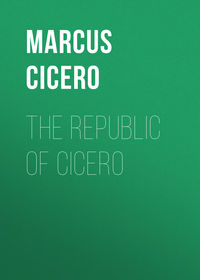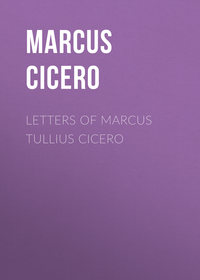 полная версия
полная версияThe Orations of Marcus Tullius Cicero, Volume 4
II. And these men speak in this way, who on account of their trifling disposition used to be considered friends of the people. From which it may be understood that they in their hearts have at all times been disinclined to a good constitution of the state, and they were not friends of the people from inclination. For how comes it to pass that those men who were anxious to gratify the people in evil things, now, on an occasion which above all others concerns the people's interests, because the same thing would be also salutary for the republic, now prefer being wicked to being friends of the people? This noble cause of which I am the advocate has made me popular, a man who (as you know) have always opposed the rashness of the people. And those men are called, or rather they call themselves, consulars; though no man is worthy of that name except those who can support so high an honour. Will you favour an enemy? Will you let him send you letters about his hopes of success? Will you be glad to produce them? to read them? Will you even give them to wicked citizens to take copies of? Will you thus raise their courage? Will you thus damp the hopes and valour of the good? And then will you think yourself a consular, or a senator, or even a citizen? Caius Pansa, a most fearless and virtuous consul, will take what I say in good part. For I will speak with a disposition most friendly to him; but I should not consider him himself a consul, though a man with whom I am most intimate, unless he was such a consul as to devote all his vigilance, and cares, and thoughts to the safety of the republic.
Although long acquaintance, and habit, and a fellowship and resemblance in the most honourable pursuits, has bound us together from his first entrance into life; and his incredible diligence, proved at the time of the most formidable dangers of the civil war, showed that he was a favourer not only of my safety, but also of my dignity; still, as I said before, if he were not such a consul as I have described, I should venture to deny that he was a consul at all. But now I call him not only a consul, but the most excellent and virtuous consul within my recollection; not but that there have been others of equal virtue and equal inclination, but still they have not had an equal opportunity of displaying that virtue and inclination. But the opportunity of a time of most formidable change has been afforded to his magnanimity, and dignity, and wisdom. And that is the time when the consulship is displayed to the greatest advantage, when it governs the republic during a time which, if not desirable, is at all events critical and momentous. And a more critical time than the present, O conscript fathers, never was.
III. Therefore I, who have been at all times an adviser of peace, and who, though all good men always considered peace, and especially internal peace, desirable, have desired it more than all of them;—for the whole of the career of my industry has been passed in the forum and in the senate-house, and in warding off dangers from my friends; it is by this course that I have arrived at the highest honours, at moderate wealth, and at any dignity which we may be thought to have: I therefore, a nursling of peace, as I may call myself, I who, whatever I am, (for I arrogate nothing to myself,) should undoubtedly not have been such without internal peace: I am speaking in peril: I shudder to think how you will receive it, O conscript fathers: but still, out of regard for my unceasing desire to support and increase your dignity, I beg and entreat you, O conscript fathers, although it may be a bitter thing to hear, or an incredible thing that it should be said by Marcus Cicero, still to receive at first, without offence, what I am going to say, and not to reject it before I have fully explained what it is;—I, who, I will say so over and over again, have always been a panegyrist, have always been an adviser of peace, do not wish to have peace with Marcus Antonius. I approach the rest of my speech with great hope, O conscript fathers, since I have now passed by that perilous point amid your silence.
Why then do I not wish for peace? Because it would be shameful; because it would be dangerous; because it cannot possibly be real. And while I explain these three points to you, I beg of you, O conscript fathers, to listen to my words with the same kindness which you usually show to me.
What is more shameful than inconsistency, fickleness, and levity, both to individuals, and also to the entire senate? Moreover, what can be more inconsistent than on a sudden to be willing to be united in peace with a man whom you have lately adjudged to be an enemy, not by words, but by actions and by many formal decrees? Unless, indeed, when you were decreeing honours to Caius Caesar, well-deserved indeed by and fairly due to him, but still unprecedented and never to be forgotten, for one single reason,—because he had levied an army against Marcus Antonius,—you were not judging Marcus Antonius to be an enemy; and unless Antonius was not pronounced an enemy by you, when the veteran soldiers were praised by your authority, for having followed Caesar; and unless you did not declare Antonius an enemy when you promised exemptions and money and lands to those brave legions, because they had deserted him who was consul while he was an enemy.
IV. What? when you distinguished with the highest praises Brutus, a man born under some omen, as it were, of his race and name, for the deliverance of the republic, and his army, which was waging war against Antonius on behalf of the liberty of the Roman people, and the most loyal and admirable province of Gaul, did you not then pronounce Antonius an enemy? What? when you decreed that the consuls, one or both of them, should go to the war, what war was there if Antonius was not an enemy? Why then was it that most gallant man, my own colleague and intimate friend, Aulus Hirtius the consul, has set out? And in what delicate health he is; how wasted away! But the weak state of his body could not repress the vigour of his mind. He thought it fair, I suppose, to expose to danger in defence of the Roman people that life which had been preserved to him by their prayers. What? when you ordered levies of troops to be made throughout all Italy, when you suspended all exemptions from service, was he not by those steps declared to be an enemy? You see manufactories of arms in the city; soldiers, sword in hand, are following the consul; they are in appearance a guard to the consul, but in fact and reality to us; all men are giving in their names, not only without any shirking, but with the greatest eagerness; they are acting in obedience to your authority. Has not Antonius been declared an enemy by such acts?
"Oh, but we have sent ambassadors to him." Alas, wretched that I am! why am I compelled to find fault with the senate whom I have always praised? Why? Do you think, O conscript fathers, that you have induced the Roman people to approve of the sending ambassadors? Do you not perceive, do you not hear, that the adoption of my opinion is demanded by them? that opinion which you, in a full house, agreed to the day before, though the day after you allowed yourselves to be brought down to a groundless hope of peace. Moreover, how shameful it is for the legions to send out ambassadors to the senate, and the senate to Antonius! Although that is not an embassy; it is a denunciation that destruction is prepared for him if he do not submit to this order. What is the difference? At all events, men's opinions are unfavourable to the measure; for all men see that ambassadors have been sent, but it is not all who are acquainted with the terms of your decree.
V. You must, therefore, preserve your consistency, your wisdom, your firmness, your perseverance. You must go back to the old-fashioned severity, if at least the authority of the senate is anxious to establish its credit, its honour, its renown, and its dignity, things which this order has been too long deprived of. But there was some time ago some excuse for it, as being oppressed; a miserable excuse indeed, but still a fair one; now there is none. We appeared to have been delivered from kingly tyranny; and afterwards we were oppressed much more severely by domestic enemies. We did indeed turn their arms aside; we must now wrest them from their hands. And if we cannot do so, (I will say what it becomes one who is both a senator and a Roman to say,) let us die. For how just will be the shame, how great will be the disgrace, how great the infamy to the republic, if Marcus Antonius can deliver his opinion in this assembly from the consular bench. For, to say nothing of the countless acts of wickedness committed by him while consul in the city, during which time he has squandered a vast amount of public money, restored exiles without any law, sold our revenues to all sorts of people, removed provinces from the empire of the Roman people, given men kingdoms for bribes, imposed laws on the city by violence, besieged the senate, and, at other times, excluded it from the senate-house by force of arms;—to say nothing, I say, of all this, do you not consider this, that he who has attacked Mutina, a most powerful colony of the Roman people—who has besieged a general of the Roman people, who is consul elect—who has laid waste the lands,—do you not consider, I say, how shameful and iniquitous a thing it would be for that man to be received into this order, by which he has been so repeatedly pronounced an enemy for these very reasons?
I have said enough of the shamefulness of such a proceeding; I will now speak next, as I proposed, of the danger of it; which, although it is not so important to avoid as shame, still offends the minds of the greater part of mankind even more.
VI. Will it then be possible for you to rely on the certainty of any peace, when you see Antonius, or rather the Antonii, in the city? Unless, indeed, you despise Lucius: I do not despise even Caius. But, as I think, Lucius will be the dominant spirit,—for he is the patron of the five-and-thirty tribes, whose votes he took away by his law, by which he divided the magistracies in conjunction with Caius Caesar. He is the patron of the centuries of the Roman knights, which also he thought fit to deprive of the suffrages: he is the patron of the men who have been military tribunes; he is the patron of the middle of Janus. O ye gods! who will be able to support this man's power? especially when he has brought all his dependants into the lands. Who ever was the patron of all the tribes? and of the Roman knights? and of the military tribunes? Do you think that the power of even the Gracchi was greater than that of this gladiator will be? whom I have called gladiator, not in the sense in which sometimes Marcus Antonius too is called gladiator, but as men call him who are speaking plain Latin. He has fought in Asia as a mirmillo. After having equipped his own companion and intimate friend in the armour of a Thracian, he slew the miserable man as he was flying; but he himself received a palpable wound, as the scar proves.
What will the man who murdered his friend in this way, when he has an opportunity, do to an enemy? and if he did such a thing as this for the fun of the thing, what do you think he will do when tempted by the hope of plunder? Will he not again meet wicked men in the decuries? will he not again tamper with those men who have received lands? will he not again seek those who have been banished? will he not, in short, be Marcus Antonius; to whom, on the occasion of every commotion, there will be a rush of all profligate citizens? Even if there be no one else except those who are with him now, and these who in this body now openly speak in his favour, will they be too small in number? especially when all the protection which we might have had from good men is lost, and when those men are prepared to obey his nod? But I am afraid, if at this time we fail to adopt wise counsels, that that party will in a short time appear too numerous for us. Nor have I any dislike to peace; only I do dread war disguised under the name of peace. Wherefore, if we wish to enjoy peace we must first wage war. If we shrink from war, peace we shall never have.
VII. But it becomes your prudence, O conscript fathers, to provide as far forward as possible for posterity. That is the object for which we were placed in this garrison, and as it were on this watch-tower; that by our vigilance and foresight we might keep the Roman people free from fear. It would be a shameful thing, especially in so clear a case as this, for it to be notorious that wisdom was wanting to the chief council of the whole world. We have such consuls, there is such eagerness on the part of the Roman people, we have such an unanimous feeling of all Italy in our favour, such generals, and such armies, that the republic cannot possibly suffer any disaster without the senate being in fault. I, for my part, will not be wanting. I will warn you, I will forewarn you, I will give you notice, I will call gods and men to witness what I do really believe. Nor will I display my good faith alone, which perhaps may seem to be enough, but which in a chief citizen is not enough; I will exert all my care, and prudence, and vigilance.
I have spoken about the danger. I will now proceed to prove to you that it is not possible for peace to be firmly cemented; for of the propositions which I promised to establish this is the last.
VIII. What peace can there be between Marcus Antonius and (in the first place) the senate? with what face will he be able to look upon you, and with what eyes will you, in turn, look upon him? Which of you does not hate him? which of you does not he hate? Come, are you the only people who hate him; and whom he hates? What? what do you think of those men who are besieging Mutina, who are levying troops in Gaul, who are threatening your fortunes? will they ever be friends to you, or you to them? Will he embrace the Roman knights? For, suppose their inclinations respecting, and their opinions of Antonius were very much concealed, when they stood in crowds on the steps of the temple of Concord, when they stimulated you to endeavour to recover your liberty, when they demanded arms, the robe of war, and war, and who, with the Roman people, invited me to meet in the assembly of the people, will these men ever become friends to Antonius? will Antonius ever maintain peace with them? For why should I speak of the whole Roman people? which, in a full and crowded forum, twice, with one heart and one voice, summoned me into the assembly, and plainly showed their excessive eagerness for the recovery of their liberty. So, desirable as it was before to have the Roman people for our comrade, we now have it for our leader.
What hope then is there that there ever can be peace between the Roman people and the men who are besieging Mutina and attacking a general and army of the Roman people? Will there be peace with the municipal towns, whose great zeal is shown by the decrees which they pass, by the soldiers whom they furnish, by the sums which they promise, so that in each town there is such a spirit as leaves no one room to wish for a senate of the Roman people? The men of Firmium deserve to be praised by a resolution of our order, who set the first example of promising money; we ought to return a complimentary answer to the Marrucini, who have passed a vote that all who evade military service are to be branded with infamy. These measures are adopted all over Italy. There is great peace between Antonius and these men, and between them and him! What greater discord can there possibly be? And in discord civil peace cannot by any possibility exist. To say nothing of the mob, look at Lucius Nasidius, a Roman knight, a man of the very highest accomplishments and honour, a citizen always eminent, whose watchfulness and exertions for the protection of my life I felt in my consulship; who not only exhorted his neighbours to become soldiers, but also assisted them from his own resources; will it be possible ever to reconcile Antonius to such a man as this, a man whom we ought to praise by a formal resolution of the senate? What? will it be possible to reconcile him to Caius Caesar, who prevented him from entering the city, or to Decimus Brutus, who has refused him entrance into Gaul? Moreover, will he reconcile himself to, or look mercifully on the province of Gaul, by which he has been excluded and rejected? You will see everything, O conscript fathers, if you do not take care, full of hatred and full of discord, from which civil wars arise. Do not then desire that which is impossible: and beware, I entreat you by the immortal gods, O conscript fathers, that out of hope of present peace you do not lose perpetual peace.
What now is the object of this oration? For we do not yet know what the ambassadors have done. But still we ought to be awake, erect, prepared, armed in our minds, so as not to be deceived by any civil or supplicatory language, or by any pretence of justice. He must have complied with all the prohibitions and all the commands which we have sent him, before he can demand anything. He must have desisted from attacking Brutus and his army, and from plundering the cities and lands of the province of Gaul; he must have permitted the ambassadors to go to Brutus, and led his army back on this side of the Rubicon, and yet not come within two hundred miles of this city. He must have submitted himself to the power of the senate and of the Roman people. If he does this, then we shall have an opportunity of deliberating without any decision being forced upon us either way. If he does not obey the senate, then it will not be the senate that declares war against him, but he who will have declared it against the senate.
But I warn you, O conscript fathers, the liberty of the Roman people, which is entrusted to you, is at stake. The life and fortune of every virtuous man is at stake, against which Antonius has long been directing his insatiable covetousness, united to his savage cruelty. Your authority is at stake, which you will wholly lose if you do not maintain it now. Beware how you let that foul and deadly beast escape now that you have got him confined and chained. You too, Pansa, I warn, (although you do not need counsel, for you have plenty of wisdom yourself: but still, even the most skilful pilots receive often warnings from the passengers in terrible storms,) not to allow this vast and noble preparation which you have made to fall away to nothing. You have such an opportunity as no one ever had. It is in your power so to avail yourself of this wise firmness of the senate, of this zeal of the equestrian order, of this ardour of the Roman people, as to release the Roman people from fear and danger for ever. As to the matters to which your motion before the senate refers, I agree with Publius Servilius.
* * * * *THE EIGHTH ORATION OF M T CICERO AGAINST MARCUS ANTONIUS CALLED ALSO THE EIGHTH PHILIPPIC
* * * * *THE ARGUMENTAfter the embassy to Antonius had left Rome the consuls zealously exerted themselves in preparing for war, in case he should reject the demands of the ambassador. Hirtius, though in bad health, left Rome first, at the head of an army containing, among others, the Martial and the fourth legions, intending to join Octavius and hoping with his assistance to prevent his gaining any advantage over Brutus till Pansa could join them. And he gained some advantages over Antonius at once.
About the beginning of February the two remaining ambassadors (for Servius Sulpicius had died just as they arrived at Antonius's camp) returned, bringing word that Antonius would comply with none of the commands of the senate, nor allow them to proceed to Decimus Brutus, and bringing also (contrary to their duty) demands from him, of which the principal were, that his troops were to be rewarded, all the acts of himself and Dolabella to be ratified as also all that he had done respecting Caesar's papers, that no account was to be required of him of the money; in the temple of Ops and that he should have the further Gaul with an army of six legions.
Pansa summoned the senate to receive the report of the ambassador, when Cicero made a severe speech, proposing very vigorous measures against Antonius, which, however, Galenus and his party were still numerous enough to mitigate very greatly; and even Pansa voted against him and in favour of the milder measures though they could not prevail against Cicero to have a second embassy sent to Antonius, and though Cicero carried his point of ordering the citizens to assume the sagum, or robe of war which he also (waving his privilege as a man of consular rank) wore himself. The next day the senate met again, to draw upon form the decrees on which they had resolved the day before, when Cicero addressed the following speech to them, expostulating with them for their wavering the day before.
I. Matters were carried on yesterday, O Caius Pansa, in a more irregular manner than the beginning of your consulship required. You did not appear to me to make sufficient resistance to those men, to whom you are not in the habit of yielding. For while the virtue of the senate was such as it usually is, and while all men saw that there was war in reality, and some thought that the name ought to be kept back, on the division, your inclination inclined to lenity. The course which we proposed therefore was defeated, at your instigation, on account of the harshness of the word war. That urged by Lucius Caesar, a most honourable man, prevailed, which, taking away that one harsh expression, was gentler in its language than in its real intention. Although he, indeed, before he delivered his opinion at all, pleaded his relationship to Antonius in excuse for it. He had done the same in my consulship, in respect of his sister's husband, as he did now in respect of his sister's son, so that he was moved by the grief of his sister, and at the same time he wished to provide for the safety of the republic.
And yet Caesar himself in some degree recommended you, O conscript fathers, not to agree with him, when he said that he should have expressed quite different sentiments, worthy both of himself and of the republic, if he had not been hampered by his relationship to Antonius. He, then, is his uncle, are you his uncles too, you who voted with him?
But on what did the dispute turn? Some men, in delivering their opinion, did not choose to insert the word "war". They preferred calling it "tumult," being ignorant not only of the state of affairs, but also of the meaning of words. For there can be a "war" without a "tumult," but there cannot be a "tumult" without a "war." For what is a "tumult," but such a violent disturbance that an unusual alarm is engendered by it? from which indeed the name "tumult"39 is derived. Therefore, our ancestors spoke of the Italian "tumult," which was a domestic one, of the Gallic "tumult," which was on the frontier of Italy, but they never spoke of any other. And that a "tumult" is a more serious thing than a "war" may be seen from this, that during a war exemptions from military service are valid, but in a tumult they are not. So that it is the fact, as I have said, that war can exist without a tumult, but a tumult cannot exist without a war. In truth, as there is no medium between war and peace, it is quite plain that a tumult, if it be not a sort of war, must be a sort of peace; and what more absurd can be said or imagined? However, we have said too much about a word; let us rather look to the facts, O conscript fathers, the appreciation of which, I know, is at times injured by too much attention being paid to words.
II. We are unwilling that this should appear to be a war. What is the object, then, of our giving authority to the municipal towns and colonies to exclude Antonius? of our authorizing soldiers to be enlisted without any force, without the terror of any fine, of their own inclination and eagerness? of permitting them to promise money for the assistance of the republic? For if the name of war be taken away, the zeal of the municipal towns will be taken away too. And the unanimous feeling of the Roman people which at present pours itself into our cause, if we cool upon it, must inevitably be damped.
But why need I say more? Decimus Brutus is attacked. Is not that war? Mutina is besieged. Is not even that war? Gaul is laid waste. What peace can be more assured than this? Who can think of calling that war? We have sent forth a consul, a most gallant man, with an army, who, though he was in a weak state from a long and serious illness, still thought he ought not to make any excuse when he was summoned to the protection of the republic. Caius Caesar, indeed, did not wait for our decrees; especially as that conduct of his was not unsuited to his age. He undertook war against Antonius of his own accord; for there was not yet time to pass a decree; and he saw that, if he let slip the opportunity of waging war, when the republic was crushed it would be impossible to pass any decrees at all. They and their arms, then, are now at peace. He is not an enemy whose garrison Hirtius has driven from Claterna; he is not an enemy who is in arms resisting a consul, and attacking a consul elect; and those are not the words of an enemy, nor is that warlike language, which Pansa read just now out of his colleague's letters: "I drove out the garrison." "I got possession of Claterna." "The cavalry were routed." "A battle was fought." "A good many men were slain." What peace can be greater than this? Levies of troops are ordered throughout all Italy; all exemptions from service are suspended; the robe of war is to be assumed to-morrow, the consul has said that he shall come down to the senate house with an armed guard.









